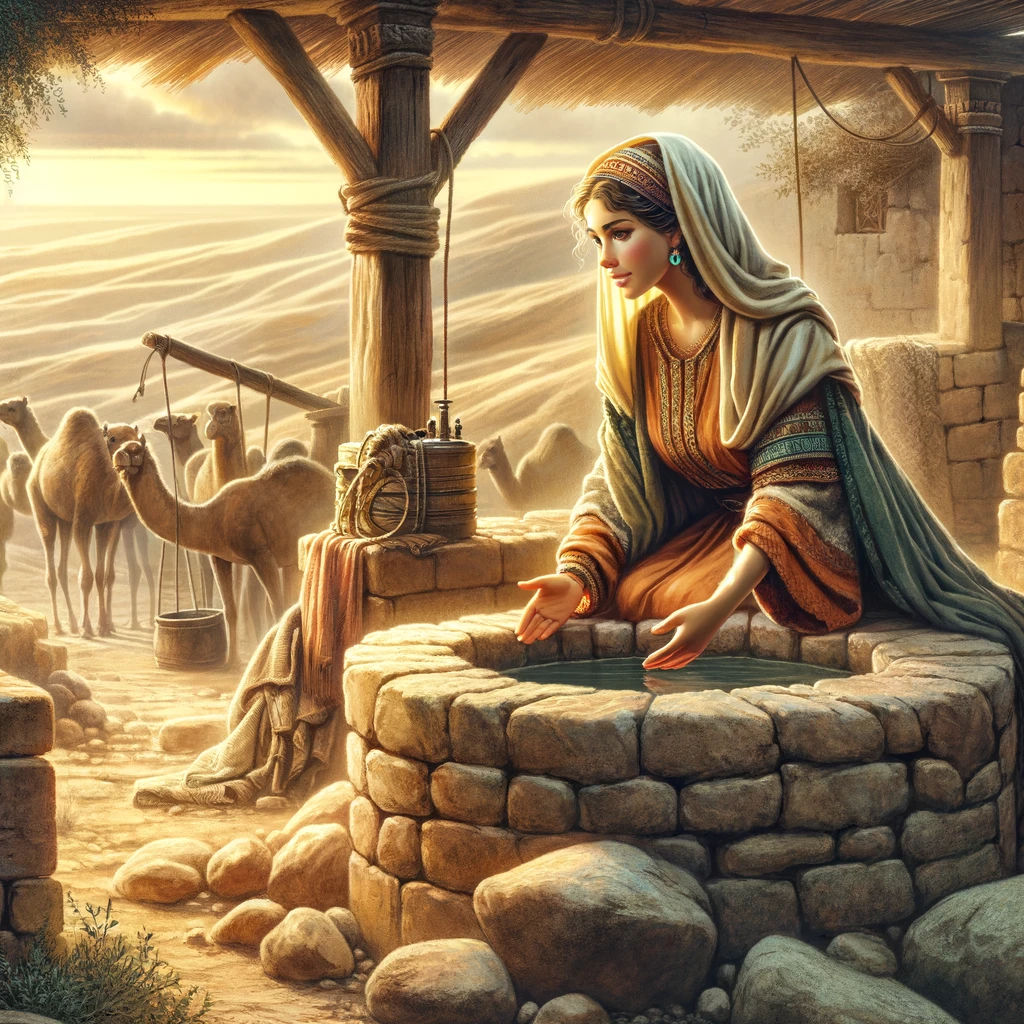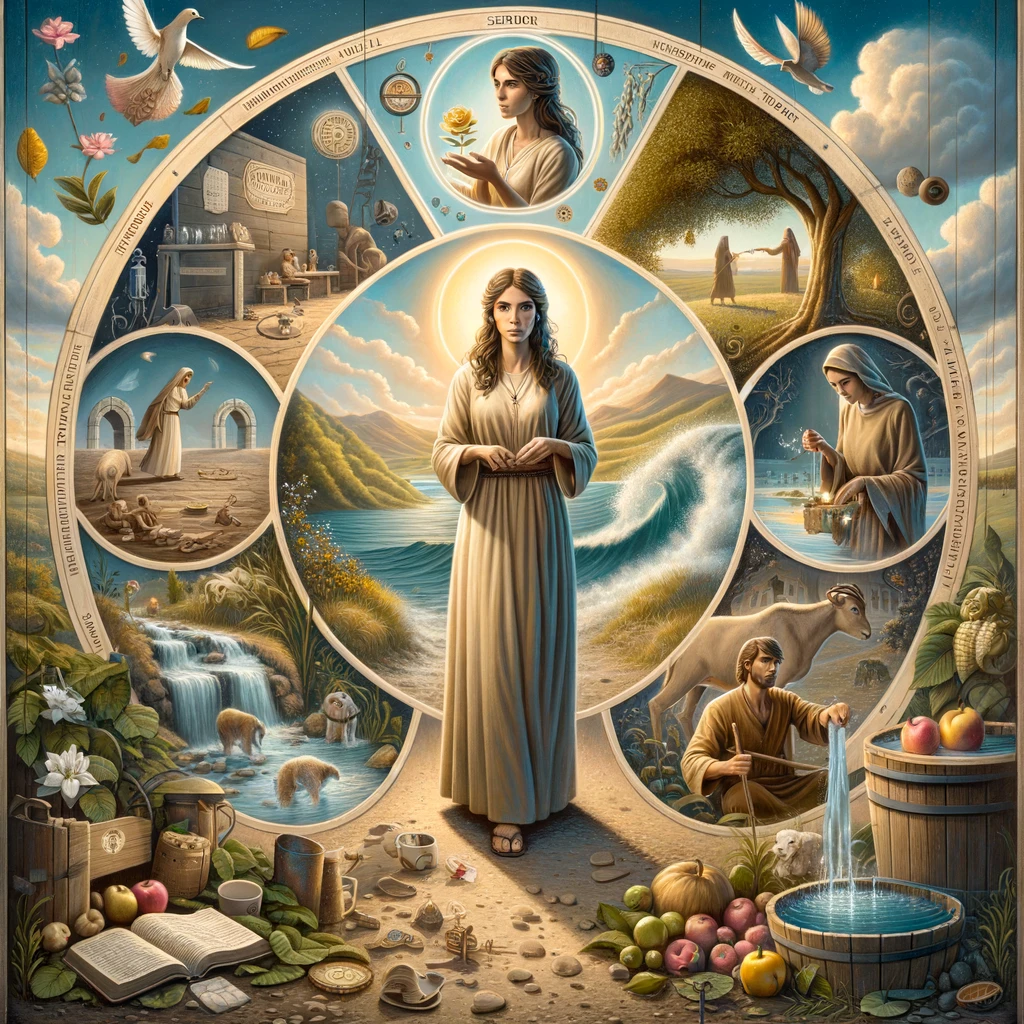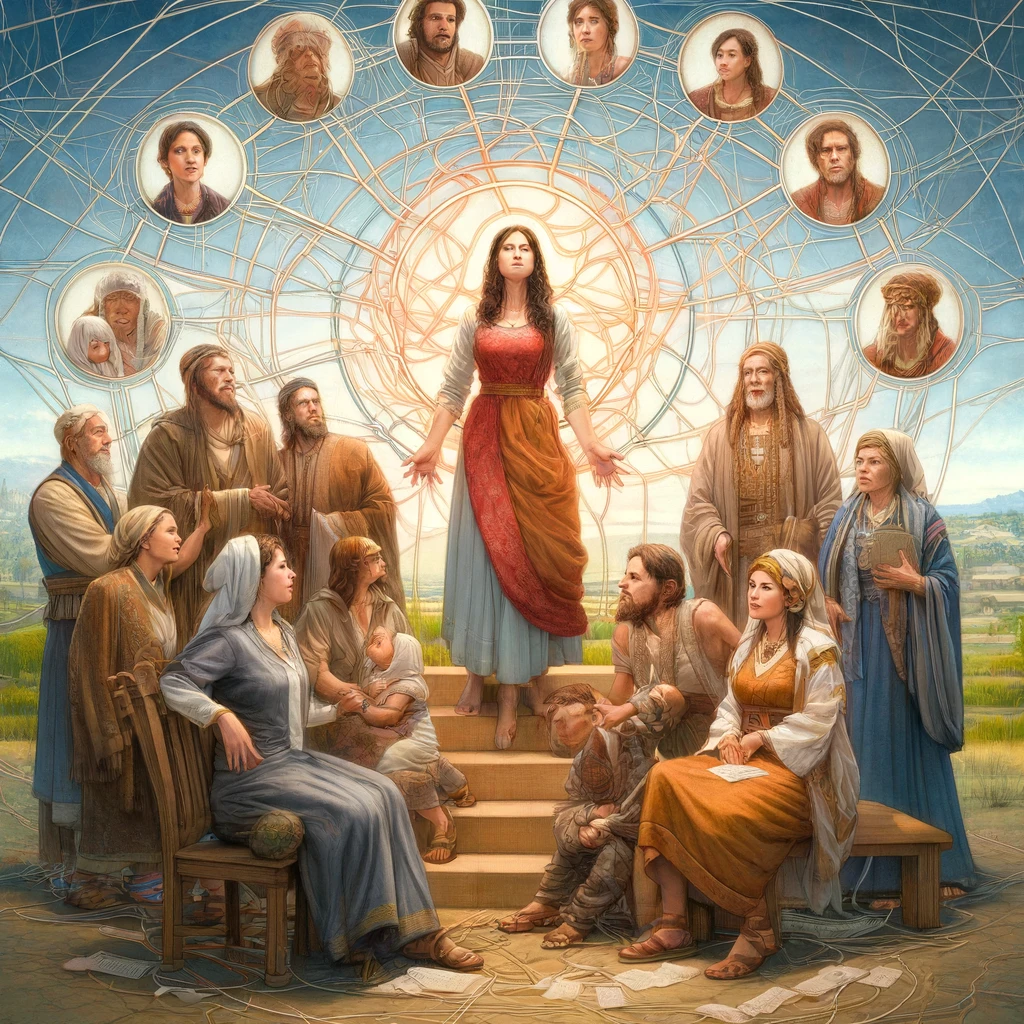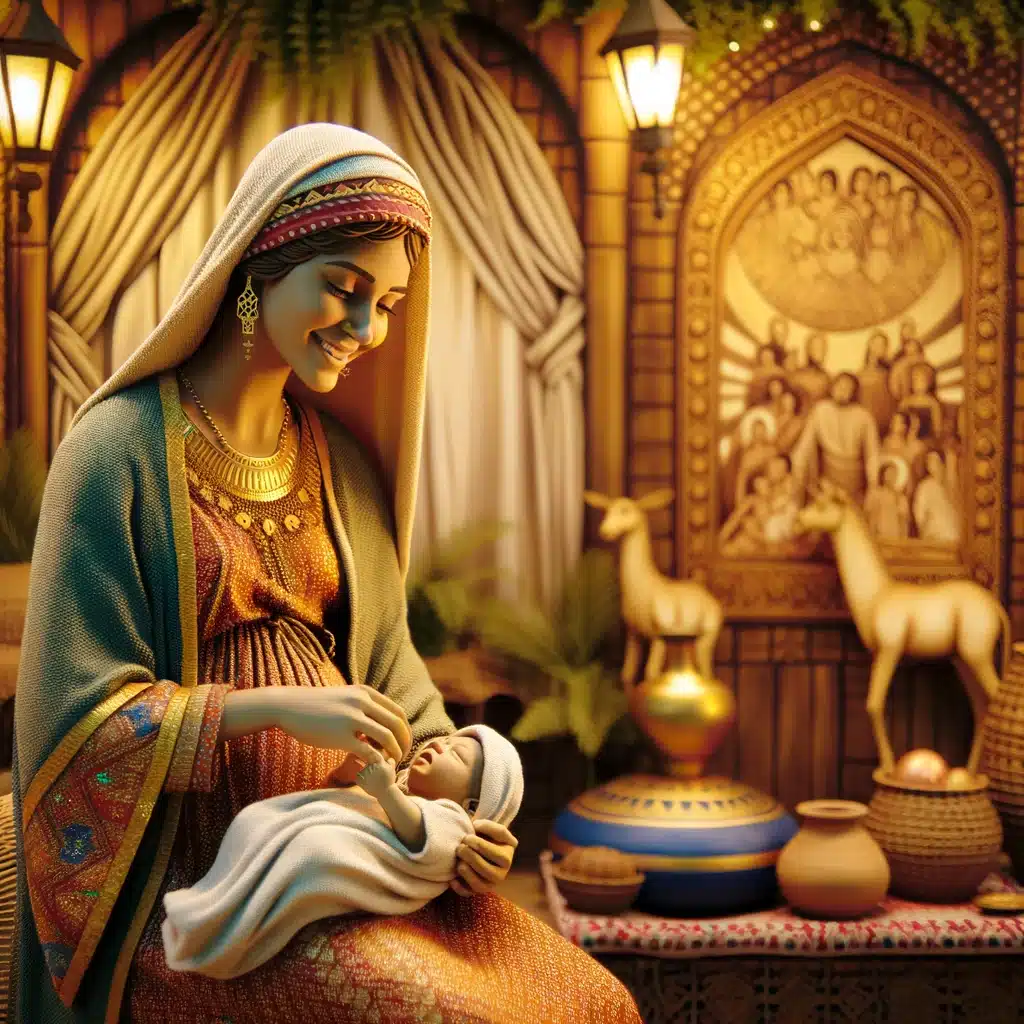Main conclusions:
- Who Rebekah was in the Bible: Rebekah is a remarkable Old Testament figure whose journey is marked by her courage, unwavering faith and willingness to follow God’s plans, even in the face of uncertainty.
- Importance in the History of Redemption: Rebekah played a crucial role in ensuring the continuity of the divine promise made to Abraham, directly influencing the course of the history of the people of Israel.
- Chosen as Isaac‘swife: Abraham, Isaac’s father, sent his servant Eliezer to his homeland to find a wife for his son. Eliezer found Rebekah by a well, and she stood out for her kindness and hospitality in offering water to him and his camels (Genesis 24).
- Mother of Esau and Jacob: Rebekah had twins, Esau and Jacob. Before their birth, God revealed to her that the elder would serve the younger, a foreshadowing of the future conflict between the two brothers (Genesis 25:23).
- Favouritism and blessing: Rebekah favoured Jacob, while Isaac preferred Esau. She played a crucial role in helping Jacob obtain Isaac’s birthright blessing, which was initially intended for Esau. By disguising Jacob as Esau, she ensured that he received the paternal blessing (Genesis 27).
who was rebecca in the bible?
Rebekah’s Destiny Plotted by Divine Hands

Who was Rebekah in the Bible is one of the most prominent and complex women in the Bible.
This Old Testament woman of courage is marked by divinely ordained events that reveal both her faith and her destiny.
Born into a blessed family, Rebekah was a woman of scriptural faith chosen by God to play a crucial role in Abraham’s lineage. Her name, which means “she who unites”, reflects the importance of her mission in biblical history.
A Woman of Courage in the Face of Challenges
The biblical Rebekah showed courage from the outset when she accepted Abraham’s servant’s proposal to marry Isaac, a man she had never met.
Her willingness to trust in God’s plan, even in the face of uncertainty, emphasises her unshakeable faith. The encounter at the well, where Rebekah offered water not only to the servant but also to his camels, illustrates her generosity and readiness to act with kindness.
Rebekah’s Vital Role in the Story of Redemption
As well as being Isaac’s wife and the mother of twins Esau and Jacob, who Rebekah was in the Bible played a crucial role in ensuring the continuity of the divine promise made to Abraham.
Her influence on the lives of her children shaped the course of the history of God’s chosen people. Through her, we see the transformative power of the strong and wise woman who acts in alignment with divine purposes.
The Depth of Faith Demonstrated by Rebekah
The biblical narrative repeatedly emphasises Rebekah’s deep faith and trust in God. Her willingness to follow the Lord’s lead, even when it meant challenging social conventions or facing family adversity, revealed her true nature as a godly woman dedicated to heavenly plans. Her example continues to inspire believers to this day.
A Lasting Legacy for Future Generations
Rebekah’s spiritual legacy transcends generations and serves as a powerful reminder of the positive impact that a life lived in faith can have on the world around us.
Her commitment to God’s will and her fundamental role in the sacred narrative of Scripture continue to inspire those who seek to better understand the mysterious ways of the Lord.
As an integral part of the sacred story, who Rebecca was in the Bible personifies the intersection between human faith and divine providence.
what does rebecca mean in the bible?

Rebekah in the Bible is a remarkable figure in the Old Testament, representing not only beauty and grace, but also strength and determination.
Her story is intrinsically linked to the lineage of Abraham, the father of nations, which emphasises her importance within the biblical narrative.
Her name means “she who unites”, reflecting her fundamental role in uniting past and future generations through her offspring.
the story of who Rebekah was in the bible
The story of who Rebekah was in the Bible begins with her providential encounter at the well, where she showed generosity and character by offering water to Abraham’s servant and his camels.
This selfless act was a prelude to her emotional journey as the wife of Isaac and mother of twins Esau and Jacob.
Her influence extends beyond the family sphere, playing a crucial role in the narratives that have shaped the history of the people of Israel.
Rebekah’s Family and Genealogical Background
As a descendant of the Abrahamic family, Rebekah in the Bible shared a deep connection with Isaac, her husband chosen by God.
Her noble lineage was marked by prominent figures such as Abraham and Sarah, central characters in the history of the Hebrew faith. Rebekah’s genealogy not only enriches her own identity, but also sheds light on the divine purposes that unfolded in her life and legacy.
the importance of who Rebekah was
The trajectory of who Rebekah was in the Bible goes beyond simple marital or parental conventions; she plays a fundamental prophetic role in revealing the divine plans for her descendants.
Her keen intuition in the face of adverse circumstances involving her sons Esau and Jacob revealed a deeper spiritual understanding of the heavenly designs underway.
Thus, Rebekah in the Bible emerges as an essential figure in the transmission of divine promises to future generations.
FIVE FACTS ABOUT REBECCA IN THE BIBLE:
- Rebekah was chosen by God to become the wife of Isaac, Abraham’s son.
- She showed courage by accepting the proposal of Abraham’s servant to marry Isaac, a man she had never seen before.
- Rebekah played a crucial role in ensuring the continuity of the divine promise made to Abraham, directly influencing the course of the history of the people of Israel.
- Her journey is marked by divinely ordained events that reveal both her faith and her destiny.
- Rebekah is remembered as a woman of courage, faith and readiness to act according to divine purposes.
Rebekah’s Resilience and Wisdom
In addition to the physical beauty that attracted Isaac at first sight, Rebekah in the Bible exhibited admirable inner qualities that sustained her family during difficult times.
Her resilience in the face of maternal challenges with the conflicting twins Esau and Jacob exemplifies not only unconditional maternal love, but also the divinely inspired wisdom that guided her crucial decisions at pivotal moments in sacred history.
In Search of Rebekah’s Origins
Who Rebecca was in the Bible, a striking figure in the biblical narrative, had her origins deeply rooted in the lineages of Abraham.
Her story goes back to the ancient traditions of the Hebrew patriarchs, placing her within a revered genealogy.
A direct descendant of Terah, Abraham’s father, Rebekah carried with her the nobility and divine promise that permeated her lineage.
Her legacy was intrinsically linked to the history of God’s chosen people and would play a crucial role in the fulfilment of divine prophecies.
The family web of who Rebekah was

In addition to her distinguished ancestral roots, Rebekah in the Bible was destined to form significant family connections with prominent figures in sacred history.
Her marriage bond with Isaac, the son of promise for Abraham and Sarah, symbolised the continuity of the divine covenant throughout the generations.
The union between the biblical Rebekah and Isaac was not merely an ordinary marriage arrangement; it was a predestined bond that would seal the fate not only of the couple, but also of their descendants – the remarkable twin brothers Esau and Jacob.
The remarkable bonds with Isaac
Isaac, the husband chosen by God for Rebekah in the Bible, represented more than just a marital connection: he personified faithfulness to divine promises and the fulfilment of prophecies about his lineage.
The union between Isaac and Rebekah in the Bible transcended earthly boundaries to encompass a greater purpose established by divine will.
These two beings were united not only as husband and wife, but as fundamental pieces on a celestial chessboard where the destiny of peoples was being mapped out.
Esau and Jacob: The Fruits of the Sacred Union
From the matrimonial bonds between the biblical Rebekah and Isaac emerged two sons as different in personality as they were destined in purpose.
Esau, the impetuous firstborn who was a skilful hunter, contrasted with Jacob, the cunning second son born holding his brother’s heel.
These twins represented the dualities inherent in human nature: brute strength versus subtle cunning; impulsiveness versus strategic planning.
The fate of these intertwined brothers would reflect not only their individual choices, but also the intricate webs of the divine plan woven since time immemorial.
The Complexity of Intertwined Fates
The family saga that began with the illustrious origins of Rebekah in the Bible culminated in a complex plot where the threads of brotherly love were mixed with the challenges of sibling rivalry.
The legacy left by this biblical matriarch would echo through the ages as a vivid reminder of the indelible influence that human decisions can have on the paths set by the Creator.
Just as the branches of a family tree branch out in unpredictable directions, so too was the course laid out for the descendants of who Rebekah was in the Bible – an interconnected series of paths woven together by the eternal touch of Divine Providence.
In Search of Love and Destiny: Meeting Isaac
A young maiden of incomparable beauty, she was found by Abraham’s servant by the well, a place that would become the stage for one of the most significant moments in her life.
The biblical account describes the scene in great detail, emphasising the purity and virtue of the girl who was destined to become the wife of God’s promised son.
Divine Providence at work
The meeting between the biblical Rebekah and Isaac was orchestrated by the divine hand, through Abraham’s faithful servant.
This servant was sent on a crucial mission to find a suitable wife for Isaac, based on specific criteria established by the patriarch.
Confirmation of the divine choice was manifested through the signs evident during that encounter at the well, reaffirming the supernatural intervention in the destiny of these biblical characters.
A Moment of Recognition and Acceptance
For Rebekah in the Bible, the meeting with Isaac represented not only the fulfilment of a prophecy or the realisation of a divine plan, but also the beginning of an intimate journey alongside the one who would be her lifelong companion.
The silent exchange of glances and subtle gestures revealed not only the connection between them, but also a mutual acceptance based on faith and trust in the Creator’s will.
The Symbolism of Deep Water
The well where the meeting took place symbolises not only a physical place where lives crossed paths, but also represents the depths of destiny intertwined between who Rebekah was in the Bible and Isaac.
Just as the waters reflected each other’s faces at that unique moment, their souls also connected on higher spiritual levels, thus sealing an eternal commitment before God.
The Beginning of a Spiritual Journey
With the meeting at the well marking the beginning of the union between Rebekah and Isaac, this biblical narrative invites us to reflect on our own journeys in search of true love and God’s will in our lives.
The inspiring story of these characters leads us to contemplate the mysteries of destiny intertwined with unwavering faith – a powerful reminder of the providential care that guides our steps towards the greater purpose set by the Creator.
In search of motherhood: Who Rebecca was in the Bible and her journey of faith and patience

Rebekah in the Bible faced the challenge of infertility, an emotional and spiritual trial that accompanied her for years. Despite her unwavering faith, childlessness was a heavy burden for the biblical Rebekah to bear.
She found herself constantly testing her patience and trust in God, wondering about her purpose and destiny.
The biblical narrative portrays Rebekah as one of the biblical women with great resilience, who persevered amid uncertainty and tears, trusting that one day her pleas would be heard.
The complexity of motherhood: Rebekah as the mother of twins Esau and Jacob

When she finally conceived, the biblical Rebekah discovered that she was pregnant with not one, but two sons – Esau and Jacob. These twins would bring with them not only double joys, but also multiplied challenges.
The relationship between the brothers began in tension from their mother’s womb, foreshadowing the future conflicts that would shape the story of their lives.
As a mother, who Rebekah was in the Bible, she found herself at the centre of a complex web of family relationships intertwined with divine prophecies about the fate of her children.
Divine prophecy: The determining role in the twins’ lives
The prophecy received by Rebekah in the Bible while she was still pregnant revealed the divergent fates of Esau and Jacob. These prophetic words cast a shadow over the brothers’ fragile relationship from the start.
While Esau was described as “a skilful hunter” destined to serve his younger brother, Jacob was destined to receive the blessings of primogeniture and lead his family in the future.
Divine prophecy was both a gift and a curse for who Rebekah was in the Bible, as it outlined the turbulent path her children would travel.
what we can learn from Rebekah
The story of who Rebekah was in the Bible is a testimony to the importance of women in the biblical narrative – strong, resilient women whose choices shaped the course of sacred history.
Her journey from infertility to the challenges of motherhood offers timeless lessons on faith, patience and acceptance of the divine plan even in the face of hardship.
By facing trials with courage and determination, Who Was Rebecca in the Bible left an enduring legacy that would resonate through subsequent generations in the Holy Bible.
FREQUENTLY ASKED QUESTIONS AND ANSWERS: WHO WAS REBECCA IN THE BIBLE?
What can we learn from the story of Rebekah?
Why was Rebekah chosen?
What are Rebekah’s qualities?
What was God’s message to Rebekah?
What did Rebekah do?
Why did Rebekah help Jacob?
What was God’s plan for Isaac and Rebekah?
Why did Isaac say that Rebekah was his sister?
Why did Rebekah cover her face with her veil when she saw Isaac?
Where does the Bible mention Rebekah’s death?
What was Rebekah’s personality like?
What does Rebekah mean in the Bible?
Carlos Alberto is a Bible scholar dedicated to helping people find answers to their questions related to Scripture. His passion and knowledge are a trusted source of guidance and enlightenment for those seeking understanding in God’s Word.






